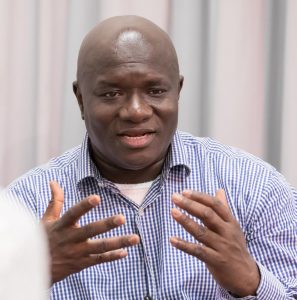Let me go straight to the point: I do not understand what is the rationale and value of the military and the intelligence representatives in the Faraba commission of inquiry. The incident that took place on Monday June 18 in that village was not about an internal or external armed violence by armed groups or a terrorist attack.

The matter was merely about citizens seeking to vent their grievance at the decision of the government to grant a mining license and the activities of a private company in their environment. In response to community displeasure the government deployed an armed police that is notorious for heavy-handedness and violence against unarmed civilians. This is how matters stand.
Hence when there is a need to set up a commission to study this matter, the membership must be individuals and institutions that are relevant to the matter and that can bring value to the fact-finding exercise. In that case this commission has nothing to do with membership from the military and the intelligence. Rather the armed and security services, as unique sectors of society are legitimate stakeholders to testify before the commission.
I would have expected that there would be a youth representative as well as representatives from the local government system or their line ministry given the various participants in Faraba itself, such as youths, Alkalolu, VDC and other community leaders. I would have also expected that there would be a sitting judge or magistrate as vice chair given that the Chairperson Emmanuel Joof is squarely apt and competent to lead the commission. While Joof is a lawyer and one time magistrate however a sitting judge would still be valuable in terms of current legal and judicial responses to the matter.
I would have also put in a member of the private sector, such as from GCCI given that this matter is deeply generated from that sector. A member from the religious community would also bring more relevance and value than the military and intelligence.
I would therefore urge Pres. Barrow to review the membership of this body before he inaugurates them.
My second issue has to do with the terms of reference. A closer look at the six-point TOR indicates only two issues in fact, i.e. investigate the stand-off between the police and the community and then recommend measures to prevent a recurrence. But the Faraba issue is more than just a protest by residents and the use of force by the police.
The Faraba incident reflects a deep-seated structural imbalance regarding laws, policies and institutions in terms of the economic, social and cultural rights of communities. It is about the right of communities to their overall environment including land and natural resources and the way and manner private capital access those productive and extractive resources. Hence the Commission must seek to understand how the ownership, management, access and control of these resources are covered by law.
It must also seek to understand the procedural paths that institutions such as Geology Unit grant mining licenses or how NEA conducts social and economic impact assessments and how communities are involved in these processes and decisions. If we fail to understand these issues and address them accordingly then we shall continue to see this kinds of incident repeat one by one throughout the country.
The TOR must also highlight the effectiveness of monitoring mechanisms to ensure that private businesses abide by ethical practices in terms of preserving the environment, sharing benefits with communities and fulfilling other corporate social responsibilities.
The TOR should also cover the issue of civil and political rights and how best could citizens enjoy these rights. In other words the Commission should look at the role of police in maintaining law and order during protests without having to unleash violence on the people. It will look at the capacity of law enforcement in terms of knowledge, skills, tools as well as values.
I strongly believe that a holistic and realistic TOR would have helped the country to identify much more needs, concerns and issues of our society that could be useful in creating better laws, ensuring progressive institutional reforms and constitution building.
I therefore submit that Pres. Barrow review the terms of reference and membership of this commission to make it more relevant and useful. If he fails to do so, I call on the Chair Emmanuel Joof to raise these issues so that they are addressed before he takes office.
From the look of things it appears the president created this commission under duress just to satisfy the public outcry against the government. This incident is symptomatic of the erstwhile 22-year dictatorship hence we cannot take light measures to address this matter. We need deep and robust approaches lest we allow the same system of mediocrity and impunity to continue.
For the Gambia Our Homeland.
